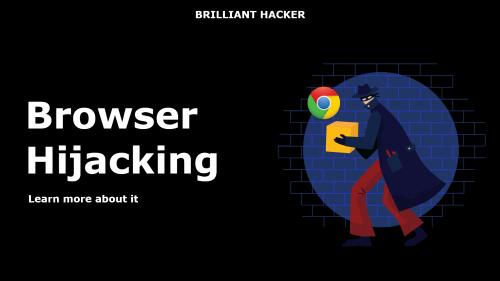Do you know about Browser hijacking?

Browser hijacking is one of the most often discussed problems on computer assistance bulletin boards. Most computer users want to know how to defend themselves from harmful invasions and outside influence.
Browser hijacking happens when unauthorized software on an internet browser changes the browser's activities. Internet browsers operate as a "window" to the internet, allowing users to search for and display information, as well as interact with it.
Small applications are sometimes added to browsers without the users' consent. Computer and software vendors, as well as hackers — or any combination of the three — create hijacking software.
The Implications and Risks
Untrustworthy persons and organizations insert their software into browsers for a variety of purposes, including:
1. Taking information from users
2. Spying on users
3. To display ongoing advertisement
4. To conduct a hard sell to a consumer that allows them to try before they purchase.
5. Sometimes hackers inject malware into browsers, directing users to websites that collect sensitive information about them.
The information is then used by cybercriminals to get access to accounts that people log in to on the internet. In rare cases, they can collect financial information and steal money or a user's identity.
However, installing software in a user's browser does not require a super criminal. Some marketing firms track internet activity to observe which websites people visit and how long they spend on particular web pages. They then either use the data to target their own ad campaigns or sell it to other firms who use the data to concentrate their marketing material.
Companies' advertising money are sometimes spent on display adverts that appear on users' devices or on messages that "follow" consumers throughout the internet.
Websites offering products or services are increasingly inserting pixels into browsers, and those pixels aren't always deleted, even when consumers reply to the advertisements or offers.
When a seller inserts a new and illegal software application straight into the browser, this is the most dangerous type of browser hijacking. The invading program might take up a lot of space on the browser's toolbar.
The goal is generally to persuade the user to purchase a complete version of software, shop on a seller's website, or search using a certain query engine.
Whether malicious or not, files injected into browsers take up storage space and slow down computer processing rates. Users must be diligent in removing these files from their systems.
How to Remove a Browser Hijacker
Some antivirus software warns users about the existence of adware and spyware, but new malware may go unnoticed, or the security software may be unable to identify the invader. Users must reinstall their browsers in these instances to restore control of the interface.
In severe cases, the hijacking malware reinstalls itself in the browser, forcing users to delete the contents of their computer, reinstall a fresh operating system and the most recent browser version, and recover their personal files from a backup.
How to Protect Your Computers Against Browser Hijacking
It is difficult to protect against browser hijacking. Cleaning directories of browser cookies and history on a regular basis is beneficial. It is also important to install and maintain high-quality antivirus software to prevent malware from infiltrating browsers.
The security software should notify users of illegal installation attempts and prompt them to take action. This decreases the possibility of infection.
Also, try to avoid using freeware apps, which may unpack malware you aren't aware of. Also, make sure to verify the download settings of any program you plan to install to limit the possibility of malicious apps infiltrating your computer.
Whatever way consumers use to protect themselves, the greatest protection begins with the regular operating system and browser upgrades, as well as prudent due diligence while accessing websites.
Brilliant Individuals with extensive experience working with security professionals from Fortune 500 organizations. Most of our hackers have worked for high-profile cybersecurity firms and have gained an understanding of how security works and how breaches occur via years of hands-on experience, with over 5000+ tasks completed to date and a daily task force limit of 300+ task force.
Hire a hacker to protect you from bad hackers.
Advertise on APSense
This advertising space is available.
Post Your Ad Here
Post Your Ad Here
Comments